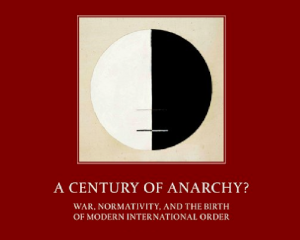On May 7, 2024, the new book “A Century of Anarchy? War, Normativity, and the Birth of Modern International Order” by Hendrik Simon was published by Oxford University Press. In the book, which is based on his dissertation, the PRIF researcher takes a critical look at the widespread notion of the “free right to war” (liberum ius ad bellum) and locates the birth of the modern prohibition of war under international law in the early 19th century.
It is generally assumed that sovereign states in the 19th century were “entitled” to use war as a political instrument whenever they deemed it necessary. It was only with the founding of the League of Nations, the Kellogg-Briand Pact and the UN Charter that this “right” was gradually outlawed, according to the general interpretation of historical developments. The “century of anarchy” in the decision for war was thus followed by a radical transformation of international law and international politics towards a general prohibition of the use of force in international relations in accordance with Article 2 (4) of the UN Charter.
In his book, Simon deconstructs the dictum of a “free right to war” and the associated narrative of progress as a myth in the History of International Relations and International Law. Part I of the book outlines a genealogy of modern justifications for war that encompasses both political and theoretical discourses since the French Revolution. Here it becomes clear that international violence has been in need of legitimization throughout modernity.
In Part II, Hendrik Simon shows that the “liberum ius ad bellum” was an invention of realist legal scholars in the German Empire who wrote against the mainstream of liberal international legal scholars. In the international historiographies between and after the world wars, however, this radical minority opinion was universalized as supposedly correct – paradoxically both by “realist” authors such as the Nazi constitutional lawyer Carl Schmitt and by liberals such as Hans Wehberg. Liberals wanted to portray international law since 1920 as particularly progressive. With great success: The narrative of the “anarchic” 19th century therefore served as a contrast to the new international legal order. This black and white thinking on the “old” order before 1920 and the “new” order after 1920 still dominates international historiography today.
“A Century of Anarchy?” offers a groundbreaking study and a fact-filled read for historians, lawyers and researchers in the fields of Political Theory, Peace and Conflict Studies and International Relations, as well as for anyone interested in the history of war and the modern international order. Simon not only artfully deconstructs the myth of “liberum ius ad bellum”, but also traces the political and theoretical roots of the modern prohibition of war back to the early 19th century. According to Hendrik Simon, the 19th century was not a “century of anarchy” – it was the era in which the modern international order was born.
Further information can be found on the website of Oxford University Press.
